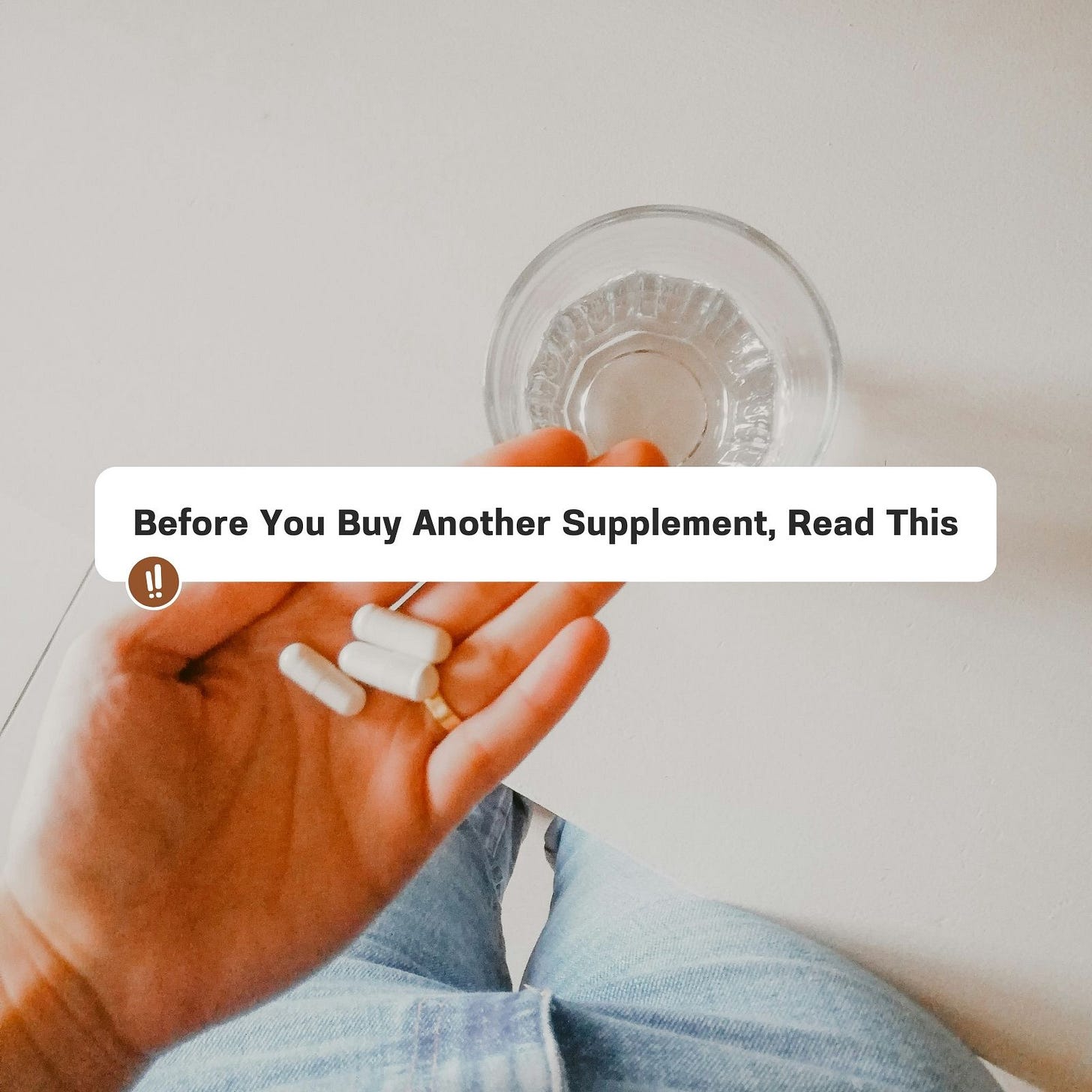Rethinking Supplements
Supplements: Are they needed or are the unhealthy? Learn my new take on supplements inside.
“You can’t supplement your way out of a crappy diet.”
I said this to my husband’s roommate back in college. We were in a heated debate about whether supplements could replace food as someone’s primary source of nourishment.
An hour later, we were still debating. He argued that everyone needed supplementation to make up for nutritional gaps. I pushed back, insisting no one needed supplements if they were willing to do the work of nourishing their body with real food.
I was a sophomore. What did I know? Other than the fact that I wasn’t going to lose an argument—especially not to a boy.
Hours later, we reached the same place most debates land: agreeing to disagree. Because let’s face it—who wants to be wrong?
What I didn’t expect was for this conversation to stick with me for years, propelling me on a journey to uncover the truth about supplements. Nor did I anticipate traveling full circle—from rejecting them entirely to relying on them, needing them, resenting them, and ultimately landing in a more balanced, informed place.
Seventeen years later, I’ve rethought everything I believed about supplements. Today, I feel confident about where I stand. It’s a more nuanced perspective—more grey than black-and-white—but it finally answers the question that has confused so many people:
Why do supplements work well for some but not for others?
In my latest podcast, I share what I’ve learned about supplements and how they relate to gut health. I HIGHLY recommend listening. (NOTE: Start with last week’s episode for essential context.)
Key Takeaways on Supplement Use:
Supplements are truly a personal topic. There is not a one-size-fits-all approach to supplements. This is why you shouldn’t immediately jump on the wagon that other influencers and health professionals are sharing with the masses (forgive me for being one of these at one point in my career).
Here are some thoughts about supplements that are worthy of noting:
Supplements are not always an energy boost. Sometimes, they’re an energy drain, which is why some people feel worse—or even physically ill—after taking them.
Supplements depend on your body's available resources. Findings from the Minnesota Starvation Experiment reveal that supplementation is only effective if your body has the energy and resources to process them (you have to eat enough to digest them).
Supplements are not a long-term solution.
Most supplements should be used seasonally, not daily. Use them as needed and on rotation rather than as a daily staple.
Supplements require support to work. They need precursors, carriers, and other resources to be absorbed and utilized by the body (a.k.a. a healthy amount of carbohydrates, protein, and fat).
Many supplements are hard to break down and absorb.
Supplements are NEVER a substitute for a ‘crappy’ diet. Food first, supplement second.
Supplements can help fill in nutritional gaps. That’s assuming the body has the resources and energy to use them.
As you can see, I’ve come full circle on supplements, but this time with research, experience, and facts to back it up. Based on our heated debate, you'll also note that we were both more right than wrong and, honestly, more similar in our thoughts than different.
Supplements can help fill gaps, but alone, they can’t create health - at least not without adequate energy and resources.
Don’t get me wrong—I’ve used supplements and still do to support my body. But I’ve also experienced harm from supplements because I didn’t understand their potential downsides.
Here’s the truth: Supplements can help, but only if you have a solid foundation of energy and resources. Without that, your body might struggle to digest, metabolize, and utilize what you’re taking.
Best-case scenario? Wasted money. Worst case? Congested systems and drained energy.
I’m not telling you not to supplement. I’m just reminding you that the supplements you’re taking are only valid based on the resources you have available.
Start with the basics, then supplement appropriately.
Build a foundation of health through nourishing food, restful sleep, stress management, and movement. Only then can we have a meaningful conversation about supplementation, and only then can your body use what you supplement it with.
Here are 7 things to establish before you worry about weight loss supplementation.
Learn how this relates to your GI health here!
I know this is controversial. You may even experience some resistance to this. I get it. I really, really do. But it may be a sweet relief for others to know why you’ve not been feeling your best!
I’d love to help you work through it. Comment with your thoughts on this, and let’s keep the conversation rolling below!




